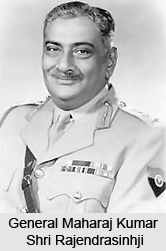 General Maharaj Kumar Shri Rajendrasinhji was born on 15 June 1899.He was mostly known as Maharaj Shri Ranjitsinhji and Rajendrasinhji Jadeja. After completing his education from Rajkumar College at Rajkot, Gujarat he got admitted to Royal Military Academy (RMA) at Sandhurst in 1919. General Maharaj Kumar Shri Rajendrasinhji joined the Indian army as a Second Lieutenant at 2nd Royal Lancers in 1922. The British Government in the Indian Army gave him different posts. During the Second World War General Maharaj Kumar Shri Rajendrasinhji showed his professional talent distinctly. In 1941 he was sent to North Africa to fight against Axis force. He fought courageously and was awarded Distinguished Service Order. He was first Indian to be honored with this award in World War II. After the world war he was appointed as the Military Attaché in Washington D.C.
General Maharaj Kumar Shri Rajendrasinhji was born on 15 June 1899.He was mostly known as Maharaj Shri Ranjitsinhji and Rajendrasinhji Jadeja. After completing his education from Rajkumar College at Rajkot, Gujarat he got admitted to Royal Military Academy (RMA) at Sandhurst in 1919. General Maharaj Kumar Shri Rajendrasinhji joined the Indian army as a Second Lieutenant at 2nd Royal Lancers in 1922. The British Government in the Indian Army gave him different posts. During the Second World War General Maharaj Kumar Shri Rajendrasinhji showed his professional talent distinctly. In 1941 he was sent to North Africa to fight against Axis force. He fought courageously and was awarded Distinguished Service Order. He was first Indian to be honored with this award in World War II. After the world war he was appointed as the Military Attaché in Washington D.C.
During the critical period of partition General Maharaj Kumar Shri Rajendrasinhji was given many crucial responsibilities. In 1947 he was promoted to Major General. After a short period he rose from the rank of Lieutenant General and served as General Officer Commanding (GOC) of Delhi and East Punjab (1947-48), GOC Eastern Command (1948) and GOC Southern Command (1948-53). He carried out Operation Polo to integrate Hyderabad State with India while he was in charge of Southern command.
General Maharaj Kumar Shri Rajendrasinhji completed courses from National Defence Academy in Dehradun in 1953 and was appointed as the Commander-in-Chief of the Indian Army. General Maharaj Kumar Shri Rajendrasinhji advised to the newly joined Army officers to maintain professionalism, loyalty, duty, and discipline, physical & mental fitness. In his great speech he said, "To-day you are on the threshold of your careers as officers of the Indian Army. Tomorrow you will become members of a brotherhood that has a code of honor and sense of duty unequalled in any other profession in the world. See to it that your responsibilities and obligations to this brotherhood do not find you lacking in spirit or energy. Your loyalty to your country and the Army must be the dominating factor. Keep abreast of your profession, and ensure that you keep pace with new weapons and their effects in applied military science. The men who respect your professional knowledge, and have confidence in your leadership will follow you anywhere. You must be the leader of your men and cannot afford to lag behind being out of condition. Go out shooting, trekking, mountaineering, go in for games that develop sound judgment, decision-making and team work, because these are the qualities that will make your career a success." - this ideally reflects his undaunted courage.
On 01 April 1955 General Maharaj Kumar Shri Rajendrasinhji assumed the charge the Chief of Army Staff. He retired on 14th May 1955 after completing years of distinguished service to the nation. He died on 01 January 1964. General Maharaj Kumar Shri Rajendrasinhji got several medals in his career. India General Service Medal (1941),Africa & Burma stars,Defence & War medals (1945),Officer of the Legion of Merit of the USA (1948),Indian Independence Medal (1947),George V Silver Jubilee Medal (1935),George VI Coronation Medal (1937).




















